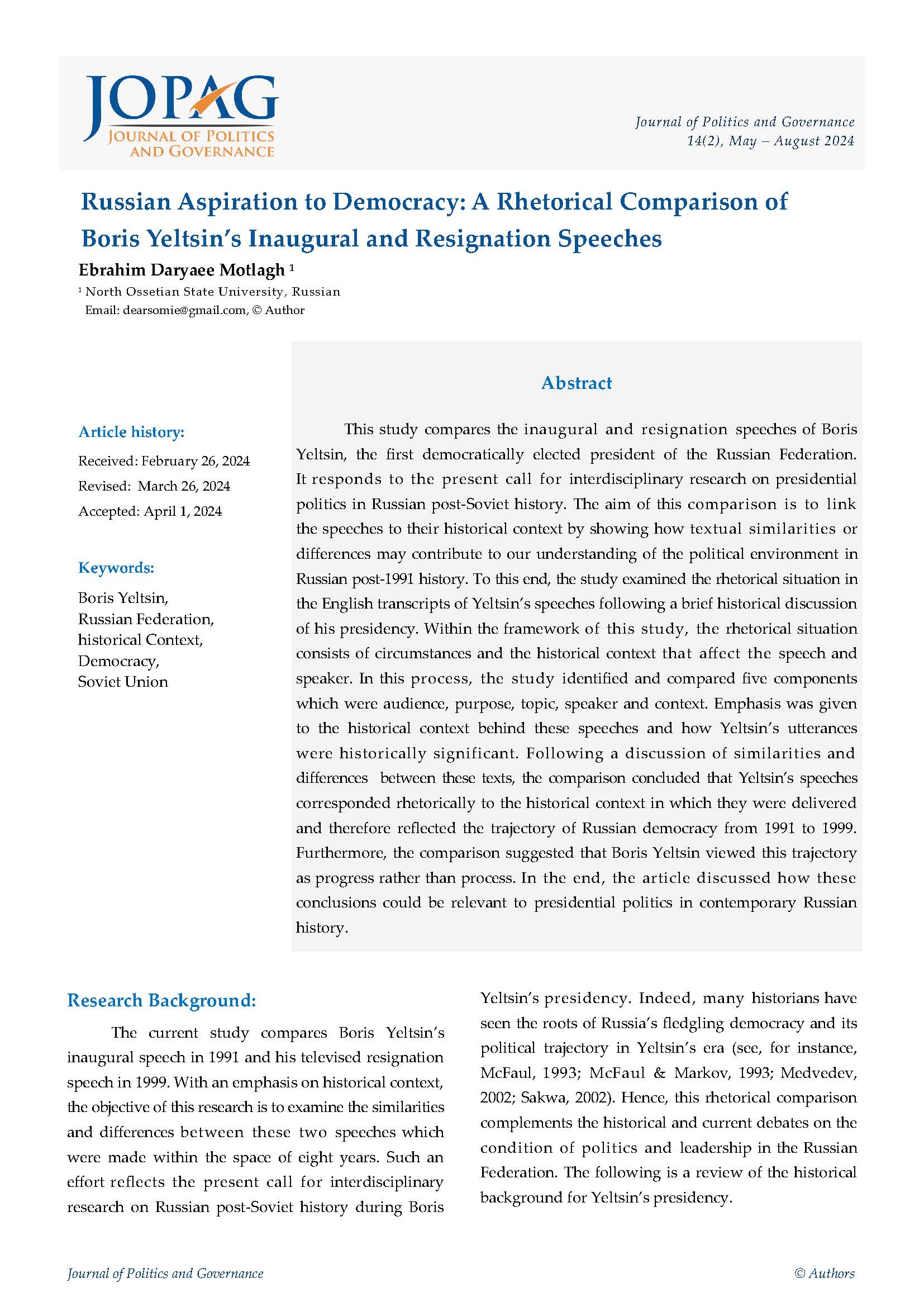Russian Aspiration to Democracy: A Rhetorical Comparison of Boris Yeltsin’s Inaugural and Resignation Speeches
Main Article Content
Abstract
This study compares the inaugural and resignation speeches of Boris Yeltsin, the first democratically elected president of the Russian Federation. It responds to the present call for interdisciplinary research on presidential politics in Russian post-Soviet history. The aim of this comparison is to link the speeches to their historical context by showing how textual similarities or differences may contribute to our understanding of the political environment in Russian post-1991 history. To this end, the study examined the rhetorical situation in the English transcripts of Yeltsin’s speeches following a brief historical discussion of his presidency. Within the framework of this study, the rhetorical situation consists of circumstances and the historical context that affect the speech and speaker. In this process, the study identified and compared five components which were audience, purpose, topic, speaker and context. Emphasis was given to the historical context behind these speeches and how Yeltsin’s utterances were historically significant. Following a discussion of similarities and differences between these texts, the comparison concluded that Yeltsin’s speeches corresponded rhetorically to the historical context in which they were delivered and therefore reflected the trajectory of Russian democracy from 1991 to 1999. Furthermore, the comparison suggested that Boris Yeltsin viewed this trajectory as progress rather than process. In the end, the article discussed how these conclusions could be relevant to presidential politics in contemporary Russian history.
Article Details

This work is licensed under a Creative Commons Attribution-NonCommercial-NoDerivatives 4.0 International License.
References
Bitzer, L. (1968). The rhetorical situation. Philosophy & Rhetoric, 1(1), 1–14.
Brudny, Y. M. (1997). In pursuit of the Russian presidency: Why and how Yeltsin won the 1996 presidential election. Communist and Post-Communist Studies, 30(3), 255–275.
Breslauer, G. W. (2002). Gorbachev and Yeltsin as Leaders. Cambridge University Press.
Consigny, S. (1974). Rhetoric and its situations. Philosophy and Rhetoric, 3, 175-186.
Colton, T. J. (2008). Yeltsin: A Life. Basic Books.
Depoy, E. (1996). Boris Yeltsin and the 1996 Russian presidential election. Presidential Studies Quarterly, 26(4), 1140–1164.
Gill, G., & Markwick R. D. (2000). Russia's Stillborn Democracy? From Gorbachev to Yeltsin. Oxford University Press.
Huskey, E. (1999). Presidential Power in Russia. Armonk, NY: M. E. Sharpe.
McFaul, M., & Markov S. (1993). The Troubled Birth of Russian Democracy: Parties, Personalities and Programs. Stanford: Hoover Institution Press.
McFaul, M. (1993). Post-Communist Politics: Democratic Prospects in Russia and Eastern Europe. Center for Strategic and International Studies.
McFaul, M. (1997). Russia’s 1996 Presidential Election: The End of Polarized Politics. Hoover Institution Press.
Medvedev, R. (2002). Post-Soviet Russia: A Journey through the Yeltsin Era. Columbia University Press.
Richards, A. I. (1965). The Philosophy of Rhetoric. Oxford University Press.
Sakwa, R. (2002). Russian Politics and Society. Routledge.
Vatz, R. E. (1973). The mythical status of situational rhetoric. Philosophy & Rhetoric, 6(3), 154 –161.
Yegorov, V. K. (1993). Out of a Dead End into the Unknown: Notes on Gorbachev's Perestroika. Edition Q.


